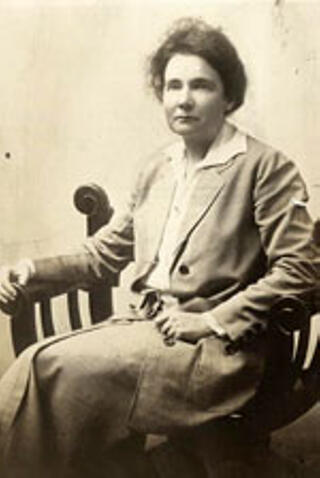From collection Candidates

Anne Martin, suffragist, writer, lobbyist, and peace activist announced as a candidate for the U.S. Senate in March 1918. She was the first woman to run for the U.S. Senate, campaigning for a seat from her home state of Nevada. She was encouraged by Montana suffrage leader Jeannette Rankin's 1916 election to the U.S. House of Representatives, as well as the possibility that the newly enfranchised women of Nevada would support of a female candidate. Martin announced her candidacy several weeks before Rankin, who campaigned for a Senate seat from Montana in 1918. Martin made gender a central issue of the campaign, arguing women could change the world. She supported Wilson on the war and argued for improved treatment of workers, new government land and food policies and, of course, a federal woman suffrage amendment. Press coverage was mixed: some newspapers praised her effort while others taunted Martin calling her a White House picketing-spinster who was not young. In fact, at the age of forty-two, she was the youngest of the candidates. She campaigned in the conventional manner, traveling throughout Nevada, mailing out election literature, and cultivating the attention of the press. In a state with few voters, she came in third with 4,603 votes. The winner polled 12,197, while the last place Socialist candidate collected only 710 votes. Although she would have preferred to win, Martin felt that her campaign paved the road for other politically inclined women: "even if I should not win, it will never seem so strange when a woman tries it." In 1920 Martin again announced her intention to run as a candidate for the U.S. Senate. She was rebuffed in her effort to win the nomination of the Republican Party and again campaigned as an Independent. Her platform emphasized the importance of pacifism and reforms that would contribute to child welfare. Although she again lost Martin continued to believe that her efforts served as a role model for other women candidates and criticized the League of Women Voters for its emphasis on civic education rather than direct political action. In Nevada she became press secretary and, in 1912, president of the state Equal Franchise Society. She often called her state "the most male in the nation" but in 1914, through the canvassing of distant mining camps and small communities, she led a successful campaign for ratification of a state woman suffrage amendment. A month after this victory President Woodrow Wilson advised Martin, "that is the way suffrage should be won, by the states.". Martin participated in national woman suffrage politics as a member of the National American Woman Suffrage Association. After concluding that a federal constitutional amendment would be a "quicker and more effective way of winning suffrage for all American women," she left NAWSA and joined "the young and untried" Congressional Union and, later, the National Woman's Party (NWP). From 1916 to 1918 she used her position as vice-chairman and legislative coordinator of the NWP to organize pressure from the states on members of Congress in support of woman suffrage. In July 1917 she was arrested for picketing on the sidewalk in front of the White House. In court she told the presiding judge, "so long as you send women to prison for asking for justice, so long will women be willing to go in such a cause." She, Alice Paul, Lucy Burns and other demonstrators, following their convictions, served time in jail. Like the militant British suffragists who had tutored her, she wore the cause of her arrest proudly. Martin also wrote articles, often discussing the need for gender solidarity in politics. She argued that elected women officials would bring women equality more quickly than equality legislation "bestowed" by men. Equality laws, she insisted, "will not and cannot equalize....But the process of winning a half share in government will go a long way toward developing a sense of equality in the minds and hearts of women....[And then] the laws will take care of themselves." Martin was a member of the national board of the American Civil Liberties Unions and, in 1926, in part to show her respect for Jane Addams, she became an organizer for the Women's International League for Peace and Freedom. Martin took herself out of the public limelight in the last years of her life although she remained interested, and at times, active, in feminist and peace causes. Martin was one of several children born to Irish-German parents living near Carson City, Nevada. Her father was a prominent, and prosperous politician and businessman viewed by some as a populist. Martin was educated at the University of Nevada and Stanford. She was, in a short academic career, the first chair of the history department at Nevada State University. An inheritance coupled with her relatives' preference that one of her brothers take charge of the family business shaped the direction of her life. She went to England where she studied Fabianism and began a many year involvement with the British suffrage movement. She organized meetings and participated in suffrage demonstrations. In 1910 she was arrested with other members of Emmeline Pankhurst's Women's Social and Political Union. In 1911 she returned to Nevada and a life committed to the use of direct action to win social and political change.





